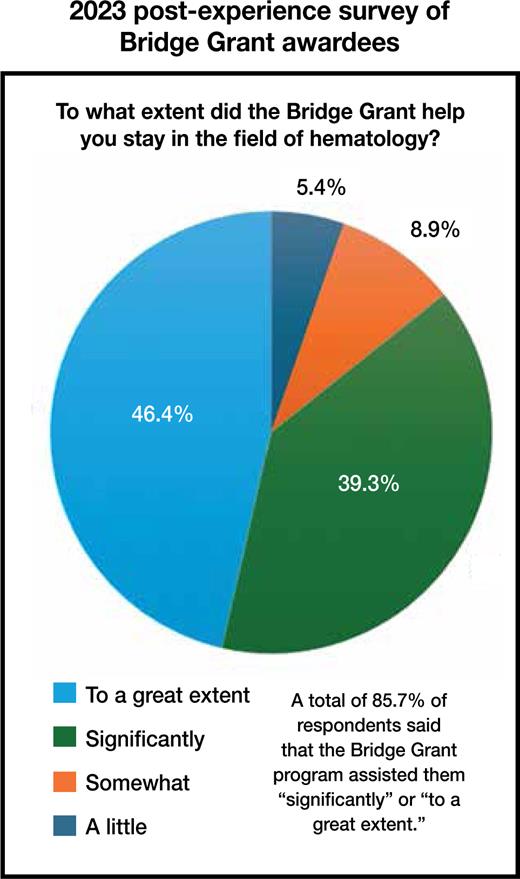In 2023, we received an ASH Bridge Grant in support of our project focused on characterizing gene expression and mechanisms regulating the translational defects that contribute to the pathogenesis of Diamond-Blackfan anemia (DBA). We also proposed to identify and characterize drugs that act as translational activators for the treatment of DBA. The grant allowed us to obtain additional preliminary data based on the reviewers’ comments for our National Institutes of Health R01 grant.
The ASH Bridge Grant allows us to develop novel technologies for genome-wide studies that identify specific translational defects contributing to the hematologic abnormalities in DBA patients. In addition, we are investigating gain- and loss-of-function of the eukaryotic translation initiation factor 4E-binding protein 1 (4E-BP1) in mouse models of DBA. From these experiments, we will be able to map the RNA structure of 5’ untranslated regions when 4E-BP1 activity increases in ribosomopathies such as DBA.
We performed a high-throughput screen of 180,000 compounds that identified drugs that increase translation in cell and mouse models of DBA. We are studying whether these drug candidates increase erythropoiesis in human hematopoietic stem and progenitor cells and elevate hemoglobin levels in RPL11 mutant DBA mouse models. Our goal is to better understand the pathogenesis of ribosomopathies such as DBA and develop novel therapies for DBA patients.
Without the support of the ASH Bridge Grant, our R01 grant would not have been funded. ASH has played a critical role in sustaining research to advance our knowledge and treatment of hematologic diseases, especially in pediatric patients. We are very grateful to ASH for the support.
Generosity of Donors Leads to New Bridge Grant
Earlier this year, ASH President Belinda R. Avalos, MD, former ASH President Barry Coller, MD, and ASH Executive Director Martha Liggett, Esq., pooled their resources to fund the creation of an additional $150,000 ASH Bridge Grant. The number of grants varies by year, and ASH encourages all eligible hematology researchers to apply.
Why did you decide to donate to the ASH Foundation in support of the ASH Bridge Grant Program?
Dr. Avalos: I’ve been fortunate to enjoy a fulfilling career in hematology, and ASH has been instrumental in helping me grow as a physician-scientist. If I can play a role in helping others pursue their dreams, I’m happy to do it.
Dr. Coller: It is always good to support outstanding research by ASH investigators, and that is especially important when there is uncertainty about federal support.
Ms. Liggett: I want to do my part to help hematologists continue their research during this difficult time. We don’t want to lose them and the knowledge that they bring to the field.
With federal cuts to scientific research, students considering a career in hematology research might be discouraged by these actions. What would you say to encourage them?
Dr. Avalos: Sometimes it helps to take a step back and remind ourselves that we are living in exciting times when it comes to hematology research. There are remarkable developments, for example, in genomic profiling and personalized medicine. Yes, the cuts in federal support are sobering, but for anyone interested in scientific discovery and potentially transforming the lives of patients, pursuing a career in hematology research is hard to beat.
Dr. Coller: Hematology research is vital to the advance of knowledge, human health, global social justice, America’s preeminence in biomedical science, U.S. economic strength, and national security. In my view, any one of these reasons is good enough to justify choosing a career in hematology and hematologic research. Together, they provide a compelling case. And despite differences of opinion, the majority of Americans believe that funding medical research is important and a good use of taxpayer funds.
To make your own donation, please visit the ASH Foundation website at hematology.org/foundation.

